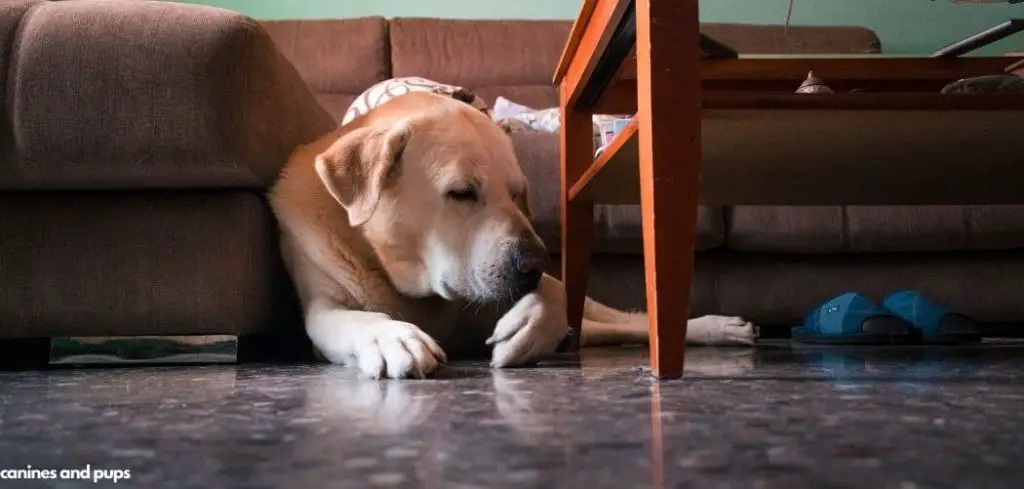Excessive licking in dogs, especially when directed at a wide range of objects, can be worrying for owners. This behavior may indicate underlying health or behavioral issues that need attention.
We outline the common reasons why a dog may excessively lick everything, what you can do at home, and when to seek veterinary help.
Dog Excessively Licking Everything — Why It Happens
Dogs may lick excessively due to a combination of medical, behavioral, and environmental factors. Common causes include anxiety, allergies, oral discomfort, gastrointestinal disturbances, and boredom. In some cases, licking everything in sight can signal more serious issues like nausea or compulsive disorders.
Recognizing patterns in the behavior and observing any additional symptoms can help determine whether veterinary intervention is necessary.

Dog Excessively Licking Everything: Common Causes
Anxiety and Stress
Anxiety and stress often lead dogs to lick objects as a self-soothing mechanism. This can happen during periods of separation, loud noises, or changes in the household.
Signs such as pacing, whining, or restlessness often accompany the excessive licking. Chronic stress can affect a dog’s overall well-being and lead to further behavioral issues if not addressed.
Allergies
Environmental or food allergies can make dogs lick surfaces in an attempt to relieve irritation or discomfort.
Licking may be concentrated on certain areas, but some dogs redirect their attention to objects nearby.
Additional symptoms can include redness, itching, sneezing, or ear infections. Allergies can worsen over time and may lead to secondary skin infections if the licking persists.
Oral Pain or Dental Issues
Dental problems, such as gum disease, tooth decay, or oral ulcers, can cause dogs to lick objects to alleviate discomfort.
The licking may be more intense after eating or during chewing. Owners might notice bad breath, pawing at the mouth, or difficulty eating.
Untreated dental issues can lead to infections, tooth loss, or systemic illness.
Gastrointestinal Upset
Stomach discomfort or nausea can prompt dogs to lick non-food items excessively. This behavior may be an attempt to calm their digestive system.
Signs of gastrointestinal upset include drooling, vomiting, reduced appetite, or changes in stool consistency.
Prolonged GI issues can lead to dehydration and nutrient deficiencies, making early attention important.
Boredom or Lack of Mental Stimulation
Dogs that lack sufficient mental and physical stimulation may develop repetitive behaviors, including licking anything within reach.
This is a common issue in high-energy breeds or dogs left alone for long periods. Owners might notice the behavior increases during times of inactivity or when the dog is left alone.
Providing enrichment can prevent the behavior from becoming a compulsive habit.
Compulsive Disorders
In some dogs, excessive licking can develop into a compulsive disorder. This behavior often occurs alongside other repetitive actions like tail chasing or pacing.
Signs include licking to the point of skin damage or ignoring normal cues from their environment.
Compulsive disorders require professional intervention to prevent long-term physical and psychological harm.
Related: Dog Excessively Licking Couch (Here’s Why)
What to Do If Your Dog Is Excessively Licking Everything
Observe your dog carefully to identify triggers and patterns. Provide sufficient exercise and mental enrichment, including puzzle toys and interactive games.
Maintain regular veterinary check-ups to rule out medical causes like dental problems or allergies. Consider dietary adjustments if food allergies or GI upset are suspected.
Calm your dog in stressful situations through reassurance, structured routines, and environmental modifications.
When to Call or Visit Your Vet
Seek immediate veterinary attention if your dog exhibits bleeding from the mouth, significant vomiting, lethargy, or drastic changes in behavior.
Skin damage from persistent licking, difficulty eating, or signs of pain should be evaluated promptly.
Chronic, unexplained licking accompanied by other symptoms may indicate underlying medical conditions that require professional treatment.
Read more: Dog licking excessively (Discover what it might mean)
Key Takeaway
Excessive licking of everything by a dog can arise from a variety of causes, ranging from anxiety and boredom to medical issues like allergies or gastrointestinal discomfort.
Monitoring the behavior and providing appropriate care at home can help manage the problem, but veterinary evaluation is crucial when symptoms persist or worsen. Early intervention ensures your dog remains healthy, comfortable, and happy.
